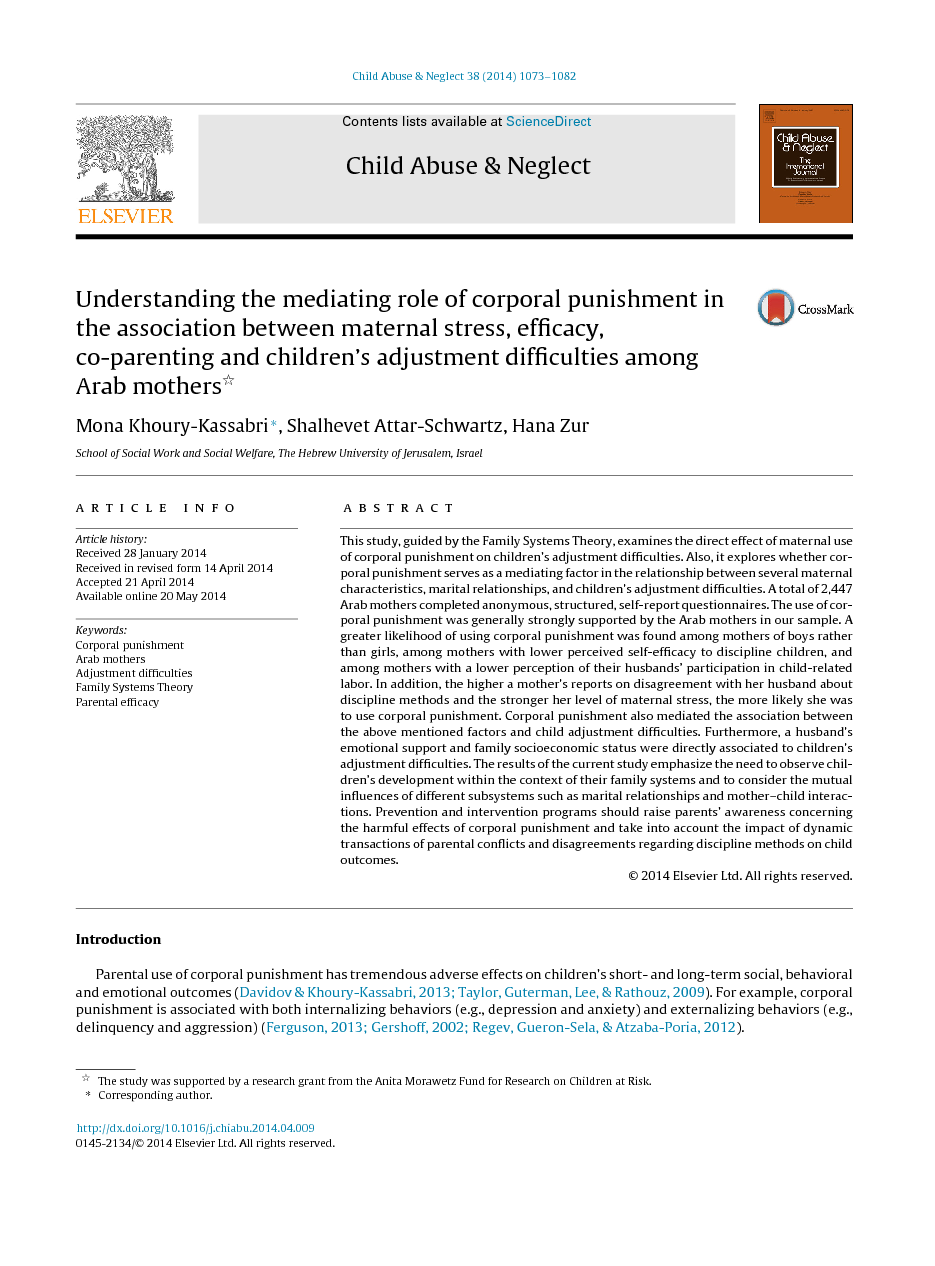This study, guided by the Family Systems Theory, examines the direct effect of maternal use of corporal punishment on children's adjustment difficulties. Also, it explores whether corporal punishment serves as a mediating factor in the relationship between several maternal characteristics, marital relationships, and children's adjustment difficulties. A total of 2,447 Arab mothers completed anonymous, structured, self-report questionnaires. The use of corporal punishment was generally strongly supported by the Arab mothers in our sample. A greater likelihood of using corporal punishment was found among mothers of boys rather than girls, among mothers with lower perceived self-efficacy to discipline children, and among mothers with a lower perception of their husbands’ participation in child-related labor. In addition, the higher a mother's reports on disagreement with her husband about discipline methods and the stronger her level of maternal stress, the more likely she was to use corporal punishment. Corporal punishment also mediated the association between the above mentioned factors and child adjustment difficulties. Furthermore, a husband's emotional support and family socioeconomic status were directly associated to children's adjustment difficulties. The results of the current study emphasize the need to observe children's development within the context of their family systems and to consider the mutual influences of different subsystems such as marital relationships and mother–child interactions. Prevention and intervention programs should raise parents’ awareness concerning the harmful effects of corporal punishment and take into account the impact of dynamic transactions of parental conflicts and disagreements regarding discipline methods on child outcomes.
Parental use of corporal punishment has tremendous adverse effects on children's short- and long-term social, behavioral and emotional outcomes (Davidov and Khoury-Kassabri, 2013 and Taylor et al., 2009). For example, corporal punishment is associated with both internalizing behaviors (e.g., depression and anxiety) and externalizing behaviors (e.g., delinquency and aggression) (Ferguson, 2013, Gershoff, 2002 and Regev et al., 2012).
Despite its negative effects, corporal punishment remains a common disciplinary method among parents (Taylor, Lee, Guterman, & Rice, 2010). Studies in the US are conflicted about the number of parents who use corporal punishment to discipline their children. Some cite as few as 26% while others claim it is closer to 70% (see for example, Regalado et al., 2004, Runyan et al., 2010 and Taylor et al., 2010). In a study of 234 Jewish and Arab mothers in Israel it was found that parents used corporal punishment on average 19.75 times in the year before the study. In Israel there is solid evidence to suggest that Arab mothers are much more likely than Jewish mothers to use corporal punishment (e.g., Khoury-Kassabri & Straus, 2011).
In order to understand child emotional and behavioral development, Family Systems Theory suggests viewing the individual within the context of his or her larger family system, rather than focusing exclusively on the child-parent relationship (Cox & Paley, 1997). This study makes use of that theory by examining the effects of multiple levels of family systems such as mothers and children, the dynamic transaction of other family subsystems such as marital relationships, and their influence on children's behavior and adjustment difficulties. This examination, which takes into account interactions between parents and children, as well as interactions between the parents themselves, expands our ability to understand the mechanisms by which child adjustment outcomes are shaped.
Based on this theoretical perspective, our study examined the direct effect of mothers’ use of corporal punishment on children's adjustment difficulties. In addition, we explored whether corporal punishment serves as a mediating factor in the relationship between children's adjustment difficulties and various maternal characteristics, such as stress and the perceived ability to discipline and set roles for children. We also explored the effects of factors relating to marital relationships, such as the perception of spousal support and attitudes about co-parenting, on children's adjustment.


